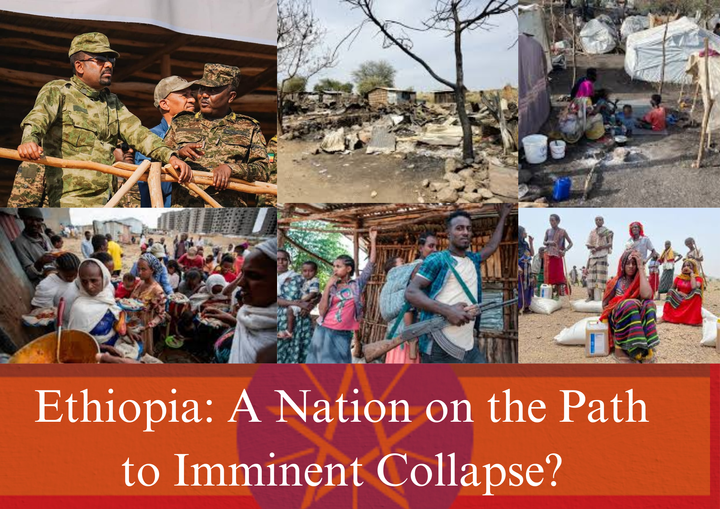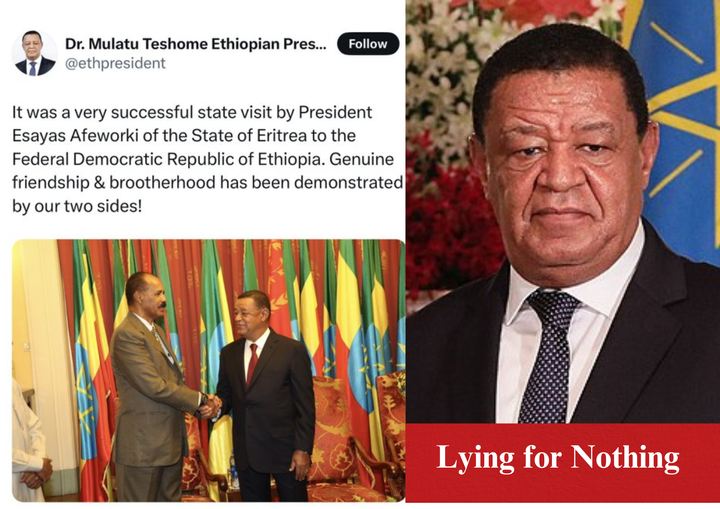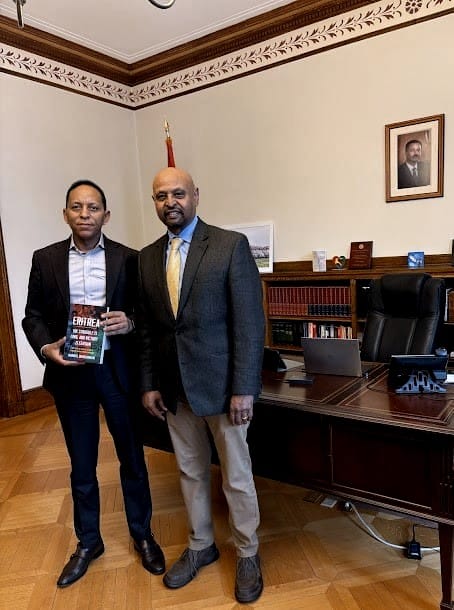Can Ethiopia Endure Under the Leadership of Abiy Ahmed Ali?
Can Ethiopia withstand Abiy Ahmed Ali's leadership amid mounting internal and external pressures? Challenges abound.

Amanuel Biedemariam 10/22/2023
In the annals of Ethiopian history, Abiy Ahmed Ali stands as a leader who achieved unparalleled support. His reception in post-World War II Ethiopia was exceptional. This approval followed a tumultuous era marked by the oppressive rule of Colonel Mengistu Haile Mariam's Derg regime, which cast a shadow of terror over the nation for nearly two decades.
Preceding this, Emperor Haile Selassie ruled with a centralized and authoritarian government. His reign resisted substantial modernization efforts, and economic challenges, including famines, beset it. Haile Selassie's rule was marred by human rights violations and stark disparities in land ownership, with many impoverished peasants and landless individuals facing unequal access. The land tenure system during his reign perpetuated inequality and hindered rural development. Moreover, Haile Selassie's reluctance to embrace social and political change was a roadblock to Ethiopia's advancement.
Abiy Ahmed Ali's leadership represents a stark departure from Ethiopia's historical challenges, ushering in a new era for the nation. Upon his assumption of power, he was met with an enthusiastic welcome from the Ethiopian people, offering a ray of hope and the potential for internal reconciliation and peace with neighboring countries, including Eritrea. This optimism was a response to Ethiopia's dire circumstances at that time.
Ethiopia grappled with a deteriorating situation in the years leading to Abiy's ascendancy. The aggressive actions of the Tigray People's Liberation Front (TPLF) sparked nationwide resistance. Between 2016 and 2018, a prolonged and widespread protest movement disrupted the established order, challenging the dominance of the TPLF-led EPRDF coalition. It became increasingly clear that the existing government structure was unsustainable. The nation stood on the precipice of civil conflict and potential disintegration with no unified leadership.
This tumultuous backdrop paved the way for Abiy Ahmed Ali, an Oromo leader representing the largest ethnic group, to take the reins in partnership with the second-largest group, the Amhara. Following a series of extensive protests, the TPLF-led government was ousted, and a reformist faction within the ruling party took charge. Abiy Ahmed, a relatively unknown intelligence officer, emerged as a charismatic and forward-thinking young leader who gained widespread approval.
The Ethiopian populace yearned for stability and leadership that embraced a sense of nationalism. They sought internal unity and aspired to achieve regional peace and economic integration.
Abiy articulated these aspirations through his words and actions, inspiring hope within Ethiopia, the international community, the region, and especially among the Eritrean people. His initiatives breathed new life into Ethiopia. When he openly committed to achieving peace with Eritrea, Eritrea responded kindly.
A significant milestone was reached when Abiy signed a peace agreement with Eritrea, acknowledging Eritrean territories and committing to regional integration. This initiative propelled the region forward, and a historic moment unfolded as Eritrea, Ethiopia, and Somalia signed a peace agreement. The dream of peace and regional integration suddenly became attainable.
Since the signing of the peace agreement with Eritrea in 2018, Ethiopia faced a significant obstacle due to the TPLF's belligerent stance. The TPLF aimed to detach Tigray from the rest of Ethiopia by annexing substantial territories from neighboring regions and Eritrea. The TPLF represented the sole impediment to Ethiopia's vision of a harmonious and cohesive nation that could effectively collaborate with countries in the region.

A Nation on the Verge: Simultaneous Crises Push Ethiopia to the Brink
Ethiopia was on the brink of collapse due to simultaneous conflicts with the TPLF and Sudan. Battling both the TPLF and Sudan concurrently made Ethiopia's chances of success highly unlikely.
The TPLF was heavily armed and held a tight grip on Ethiopia's military establishment. Most of the highest-ranking military officials in Ethiopia hailed from Tigray. During that period, Tigray's military was in control, not Ethiopia's, and Abiy Ahmed had limited authority over the military.
As a result, when the TPLF initiated a conflict against Ethiopia, Ethiopian troops who had been stationed in Tigray for an extended period were targeted and compelled to flee to Eritrea without basic necessities.
Eritrea extended a helping hand to these refugees, providing them with shelter and clothing and arming them before sending them back to participate in the fight to regain control of Ethiopia.
To their credit, the people of Amhara, Afar, and the Wollo region rose to the occasion, joined forces with Eritrea, and collaborated with the Ethiopian military loyal to Abiy. Together, they successfully defeated the TPLF.
During that pivotal moment, the Abiy administration was given a remarkable opportunity to guide a unified Ethiopia into a new era of collaboration and regional potential. The essential step to achieving this was the removal of the TPLF and Article 39 from the constitution to foster Ethiopia's unity.
Yet, instead of pursuing this promising course, Abiy yielded to pressure from the Biden administration, granting the TPLF an opportunity to regroup and launch sustained attacks on Ethiopia's Afar and Amhara regions. Throughout these unrelenting assaults, Abiy appeared apathetic to the anguish and adversity faced by millions in these areas. Despite the unwavering resolve of the Ethiopian people and the renewed opportunity for unity and advancement, Abiy's dedication to a unified Ethiopia now raises doubts.
Additionally, under the influence of the Biden Administration, Abiy entered into the Pretoria Agreement, affording the TPLF another opportunity to advance its agenda. Concurrently, the military and Oromo forces launched attacks on the Amhara region. The Amhara region, known for its strong sense of nationalism, became a prime target.
Abiy Ahmed's Strategy: Isolating Nationalists, Aligning with Secessionist Groups, and Stoking Regional Tensions
Strategic Intent to Weaken Amhara Region: Abiy Ahmed's long-term strategy appeared to revolve around undermining the Amhara region, a resource-rich area integral to the Arabian Nubian Shield and the source of the Nile River. His plan involved forming a coalition with the TPLF, prolonging Eritrea hostilities. This strategic move was underscored by the pursuit of port ownership, further complicating the regional landscape.
Repercussions of Abiy's Strategy: Abiy Ahmed's strategic choices have had far-reaching repercussions. His alignment with groups like the TPLF and Oromo, which promote secession, has distanced the most nationalist segments of Ethiopia's population from the broader Ethiopian identity. A significant portion of the population, including Oromo at 35.8% and Tigray at 5.7%, no longer identifies with the broader Ethiopian identity—an alignment seemingly endorsed by Abiy.
Under the consistent attacks and pressures from Abiy's military and Oromo nationalists, the Amhara people have become strong defenders of their region, with a reduced focus on a broader Ethiopian identity.
Additionally, approximately 8% of the population in the Ogaden region, the Somali part of Ethiopia, has harbored aspirations for independence for decades. Abdi Ile, the regional administrator of Somalia, was the first to express intentions of invoking Article 39 and pursuing secession, leading to his incarceration by Abiy Ahmed Ali.
Intensifying Regional Tensions: Abiy Ahmed further escalated regional tensions by invoking the demographic distribution of the Afar people. He urged the parliament to consider the demographics, especially in the context of the Afar Triangle. The Afar community spans Ethiopia, Djibouti, and Eritrea, with approximately 1.5 million Afars residing near the Red Sea. Abiy's objective was to enable the Afaris to collectively pursue secession, fostering instability in Eritrea and Djibouti while leveraging Ethiopian Afars to assert territorial claims. However, this approach encroached upon Eritrean and Djiboutian territories.
Threat to Somalia: Abiy Ahmed's Ethiopia poses a similar threat to Somalia. In 2018, he entered a tripartite agreement with Somalia and Eritrea. However, he is undermining Somalia's sovereignty by strengthening bilateral relations with Somaliland and capitalizing on the strategic Berbera Port. As part of the Berbera Corridor development, road networks expanding from Berbera Port to the Ethiopian border are enhancing trade opportunities without the consent of the Somali government, potentially provoking tensions.
Additionally, Eritrea is actively engaged in building Somalia's military institutions, encompassing the navy, airforce, and overall military establishment. Abiy Ahmed's actions have thus ignited tensions on multiple fronts, raising concerns about the region's stability and sovereignty.
Abiy Ahmed's Geopolitical Balancing Act: Implications for Regional Stability and Sovereignty
Abiy Ahmed's Ethiopia is a member of the BRICS countries and actively participates in China's Belt and Road Initiative (BRI). Paradoxically, Ethiopia is also seeking Western aid and financial investments. While the United States is globally countering China's BRI influence, Abiy Ahmed appears to be courting multiple actors simultaneously. What's concerning is that this approach may come at the expense of neighboring nations, raising questions about regional stability and the sovereignty of these countries.
In a recent address to parliament, Abiy Ahmed emphasized Ethiopia's aspiration to secure sea access, promoting a vision of a more fantastic Ethiopia. Notably, in January 2019, Abiy met with George Soros of the Open Society Foundation, receiving substantial funding of millions of dollars in October of the same year. Abiy's domestic and regional agenda prioritizes the advancement of a more fantastic Oromia-centered Ethiopia, diverging from the TPLF's greater Tigray agenda.
Abiy employs a multi-faceted strategy, engaging with various international players to gain regional geopolitical advantages. While doing so, he risks undermining both Ethiopia and the broader region. The critical question is whether the countries in the region will passively observe his actions as he potentially disrupts their sovereignty, regional stability, and integration efforts.
Ethiopia faces pressures from both internal and external sources, making it imperative to assess whether Abiy Ahmed Ali's actions will lead to the further division of the nation along ethnic lines, a path initially carved out by the TPLF and currently followed by Abiy.
In conclusion, Abiy Ahmed Ali's leadership in Ethiopia has garnered significant support and marked a departure from the nation's historical challenges. However, his approach has raised questions about the region's stability and the sovereignty of neighboring nations. His strategic moves, including alignments with secessionist groups and involvement in geopolitical balancing acts, have cast a shadow over Ethiopia's unity and regional relationships. The nation faces internal and external pressures, making assessing the potential consequences of Abiy's actions vital. The critical question is whether Ethiopia can withstand the various challenges or face further division along ethnic lines, a path set by the TPLF and seemingly followed by Abiy.
Note: Now, more than ever, staying informed about these developments is crucial.
Consider subscribing to our platform for in-depth analyses like this one helping you understand the complex dynamics at play. Your support is invaluable in providing comprehensive coverage. By subscribing and donating, you directly contribute to our mission of delivering essential insights and promoting dialogue. Join us in our commitment to fostering a better understanding of the world's most pressing issues.




Comments ()